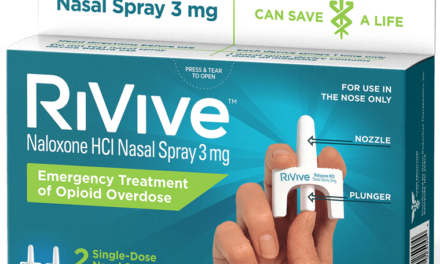The US Food and Drug Administration (FDA) approved Pfizer Inc’s Braftovi (encorafenib) with Mektovi (binimetinib) for the treatment of adult patients with metastatic non-small cell lung cancer with a BRAF V600E mutation, as detected by an FDA-approved test.
The FDA also approved the FoundationOne CDx (tissue) and FoundationOne Liquid CDx (plasma) as companion diagnostics for encorafenib with binimetinib. If no mutation is detected in a plasma specimen, the tumor tissue should be tested.
In the US, Braftovi plus Mektovi was approved in 2018 for the treatment of patients with unresectable or metastatic melanoma with a BRAF V600E or V600K mutation. Braftovi is also approved, in combination with cetuximab, for the treatment of adult patients with metastatic colorectal cancer with a BRAF V600E mutation.
“Today’s approval builds on our long-standing commitment to deliver innovative, personalized medicines to patients with lung cancer. By pursuing precision medicines that target a patient’s specific type of cancer, we are leveraging our deep understanding of tumor biology to help address the underlying cause of disease,” says Chris Boshoff, MD, PhD, chief oncology research and development officer and executive vice president at Pfizer, in a release.
The FDA’s approval is based on data from the ongoing phase 2 PHAROS clinical trial, an open-label, multicenter, single‑arm study examining Braftovi plus Mektovi combination therapy in both treatment-naïve and previously treated patients with BRAF V600E-mutant metastatic non-small cell lung cancer.
“BRAF V600E mutations identify a unique subtype of metastatic non-small cell lung cancer that presents an actionable biomarker that precision medicines like Braftovi + Mektovi combination therapy can help address,” says Gregory Riely, MD, PhD, vice chair of clinical research in the department of medicine at Memorial Sloan Kettering Cancer Center and PHAROS investigator, in a release. “The PHAROS trial demonstrated that these patients could benefit from Braftovi + Mektovi targeted therapy regardless of their prior treatment history. Given the specific efficacy and safety profile, patients and providers now have another option to help personalize treatment plans based on individual risk factors and preferences.”
The PHAROS study met its major efficacy outcome measures of objective response rate, as assessed by independent review committee, and duration of response in both treatment groups. For treatment-naïve patients (n=59), objective response rate was 75% (95% CI: 62, 85), and 59% of the patients responded for at least 12 months. Median duration of response was not estimable for this group at the time of data cutoff. For previously treated patients (n=39), objective response rate was 46% (95% CI: 30, 63), and 33% of the patients responded for at least 12 months. Median duration of response was 16.7 months (95% CI: 7.4, NE). These data were presented earlier this year at the 2023 American Society of Clinical Oncology Annual Meeting and simultaneously published in the Journal of Clinical Oncology.
The most common (≥25%) all-causality adverse reactions observed in the PHAROS trial were fatigue, nausea, diarrhea, musculoskeletal pain, vomiting, abdominal pain, visual impairment, constipation, dyspnea, rash, and cough. A total of 17% of patients experienced an adverse reaction that resulted in permanent discontinuation of Mektovi, and 16% experienced an adverse event that resulted in permanent discontinuation of Braftovi. Serious adverse reactions occurred in 38% of patients. Serious adverse reactions occurring in ≥2% of patients included hemorrhage (6%), diarrhea (4.1%), anemia, dyspnea, pneumonia (3.1% each), arrhythmia, device-related infection, edema, myocardial infarction, and pleural effusion (2% each). Fatal adverse reactions occurred in 2% of patients, including intracranial hemorrhage and myocardial infarction (1% each).
About BRAF V600E-mutant Non-Small Cell Lung Cancer
Lung cancer is the second most common type of cancer and the number one cause of cancer-related death around the world. Non-small cell lung cancer accounts for approximately 80-85% of all lung cancers.
Certain lung cancers are linked to acquired genetic abnormalities like a BRAF V600E mutation. By using biomarkers to identify a person’s particular tumor type, treatment can become more personalized and effective, since the molecular makeup of a person’s cancer often determines how they respond to different therapies.
A BRAF V600E mutation occurs in approximately 2% of NSCLC cases. It stimulates tumor cell growth and proliferation by altering the MAP kinase signaling pathway. Targeting components of this pathway could potentially help inhibit tumor growth and proliferation caused by BRAF mutations.
Precision medicine is increasingly being developed for NSCLC patients with genetic changes, such as BRAF mutations, that can be detected using biomarker tests. In recent years, more widespread use of biomarker testing and targeted therapies have been associated with improvements in population-level non-small cell lung cancer mortality.
Photo 269054082 © Bang Oland | Dreamstime.com










